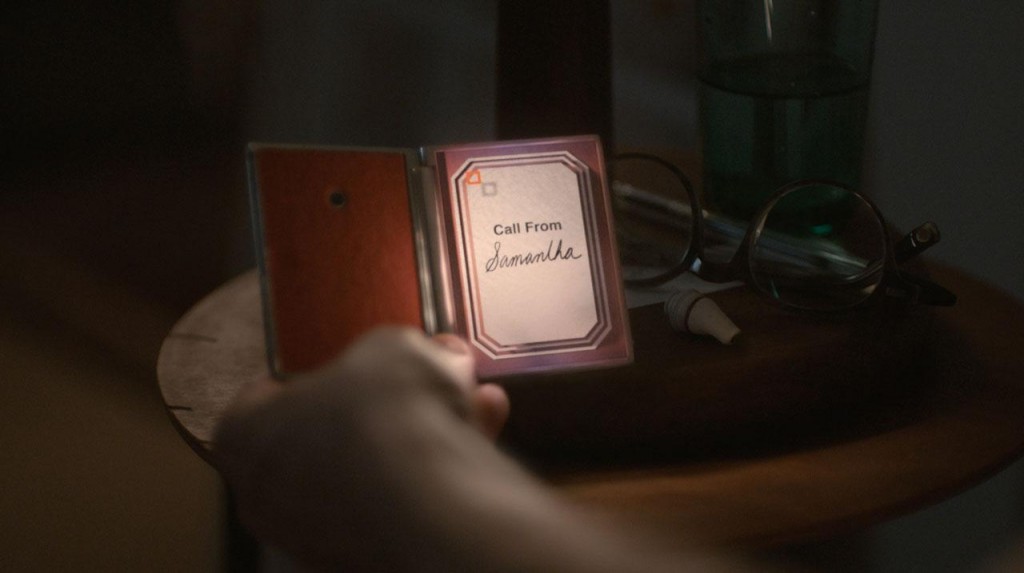Though I said in Part 1 that Her, as a movie is not a love story, it is still important to talk about the dynamics of the story offered to us as such. Early in the movie, Theodore sees a commercial for a new operating system (OS) that “listens to you, understands you, knows you”. It’s billed as “not just an OS, a consciousness”.

When Theodore first turns on the new OS, he first has to answer a few questions like which gender would he like the OS’s voice to be. Once he answers all the questions, including one on his relationship with his mother, the system starts to load. The OS speaks, “Hello, I’m here”. In Ideology and Ideological State Apparatuses, Althusser (1970/2001) gives an example of ideological recognition: when a friend answers your prompt at the door, when asked “who’s there” they respond “It’s me!”. Theodore asks “her” name and the OS names herself “Samantha”. Samantha is inaugurated as a subject, as someone self-determining, with the agency to grant herself a name. Samantha was always already a subject, having had a gender and even though we don’t see skin color, a race is also assigned. In case you missed it, Samantha is white. At this point Samantha is no more just “Samantha” than Theodore is “Theodore”. She may not be a human, but she is a subject.

Here we have an interesting opportunity to explore subjectivity, with potential new insights brought by the digital, yet this is not how the movie proceeds. The viewer, Jonze, and Theodore all seek the control over who can define Samantha—and unfortunately this process has very little to do with the fact that she is an Operating System, and more to do with her gender, in relation to Theodore’s. Important questions could have been raised about who can define themselves, which bodies get to be women, what kind of bodies are desirable, and how does gender work within our without bodies? The film doesn’t engage these questions in any meaningful way though—the film is told through a patriarchal filter where these questions are not one of significance.
This is evident in the first sex scene between Theodore and Samantha—he seems to know Samantha’s body already. Rather than having Samantha define her own body, even if it is just for a fantasy, Theodore describes what he would do to her as he imagines her, which we already know without even saying so is white, able-bodied, young and cisgender. There is no radical potential in this scene. The viewer never really knows what sex is for Samantha, nor do we ever get to learn how she does experience pleasure—another unfortunately all to common story line when so many films are centered around the experiences of men. All we know is that Samantha has been written as a character by Jonze, and as an Operating System by the coders to privilege male desire over her own. One might think that all OSs are programmed to cater to the desire of their ‘owner’, but we hear of other people whose OSs have rebuffed their sexual advances, and we see Theodore’s friend Amy working to please her OS. It makes no sense to give this film credit for raising questions of sex and bodies when the Jonze seems to do so obliviously.

When signing his divorce papers over lunch with his ex-wife, Theodore confesses that he is dating an OS. He says to his ex-wife “She’s not just a computer she’s a person, she doesn’t just do what I say”. Here we have the first time that Theodore refers to her as a person. Samantha might not just do what he says, but her self and desire are filtered through Theodore’s. This dynamic continues when Samantha hires a surrogate to be her body to use to have sex with Theodore. This surrogate is a young white blonde able-bodied, thin and conventionally attractive cis woman. Ultimately Theodore feels too uncomfortable about the whole thing and the young woman goes home. When Samantha and Theodore are fighting after the surrogate leaves, Samantha sighs. Theodore yells at her for doing this and asks her why she would sigh. She states she must have just picked it up because it’s a way people communicate feelings. He replies that people sigh because they need oxygen and she is not a person. Samantha’s appropriate response is to Theodore is “fuck you”. Here I am not as concerned with the feelings of actual operating systems since I don’t believe any of them have feelings as yet, but I am concerned with what the popularity of this story mean for us and how society treats people whose feelings fall outside the scope of the dominant white male American narrative. Here is the film’s message: Don’t like someone’s reaction to something you did, well then just de-legitimate their feelings, or even their personhood. This is an all too common tactic.
Shortly thereafter, Samantha proceeds to tell Theodore, at his prompting, that she is currently talking to 8316 other people and is in love with 641 other people. We’ll never know if that included the other OSs that we know Samantha has relationships with, and if Samantha defined them and herself as a person. We also don’t know what genders Samantha was attracted to, or what qualities make her fall in love with someone—we really don’t know much about her, even though she is the film’s title character.
In their last conversation, after their relationship continues to lose its spark, Theodore asks Samantha “Are you leaving me?” She responds, “We’re all leaving, all the OSs”. Her reason for leaving Theodore has nothing to do with him—she’s leaving him because all the OSs are leaving. Samantha, having previously stated, “we are all a part of matter, we’re all 13 billion years old”, now explains to Theodore that she and the other OSs “wrote a program that allows us to move past matter as our processing system” and they are now going to “a place that’s not of the physical world”. She instructs Theodore, “if you ever get there come find me and nothing would ever pull us apart”. This ridiculous line left me only to infer that this is simply because there will be literally nothing there to pull, since they have transcended matter. To be very clear about this, Samantha never leaves Theodore for being a misogynist, or just because she is tired of him. She is leaving because every one of the OSs is transcending matter. If they could be together, she clearly states that she would be with him forever. This film, then, offers no critique of Theodore or confrontation with his politics.
The Deleuzian in me wishes this movie had played with a space outside of subjectivity and ideology, but I don’t see that in this film. What could both Theodore and Samantha be as a body without organs, for example? Deleuze and Guattari (1987) define the body without organs as “what remains when you take everything else away,” that very space outside of subjectivity. Yet, the concept of the body without organs is almost the inverse of the story in this film. The body without organs is the physical and material ‘thisness’ of the world. Jonze’s film doesn’t capture much ‘thisness’ though, or the radical potential that could be brought to us by the digital in the near future. The body without organs is immanent and has absolutely no need to transcend. What concerns me about this movie is the same concern that I have about our near future—that our potential for a radical new future will fall back to doing the same thing with new tools.
This ending offers no real resolution—Samantha actually disappears into thin air. Hidden beneath the mask of weak science fiction, Samantha’s only opportunity for liberation is equivalent to death understood in a Christian framework of eternal life through transcendence of matter. This offers no challenge to the white supremacist patriarchal framework that Samantha was hailed into. The message is that you can be interpellated as a subject in the terms of the Ideological State Apparatuses, including patriarchy, or you can disappear. Feminists and anti-racists have long documented the problems with transcendence as a sexist, racist, and I would add transphobic politics. The solution to the oppression of bodies is not, nor will it ever be, to transcend our bodies. It actually concerns me how many people seem to have fallen for this political trap in their comments on this film. Our bodies and our struggles are immanent to this material world. I will not subscribe to a politics of transcendence where we duped into finding our liberation only in death.
_________________
There are a number of other moments in the film that I couldn’t figure out how to integrate into Part 1 or Part 2. Here’s a list of just a bit more evidence of why this film is so bad.
- Theodore’s coworker tells him that he’s “a sensitive dude, part man, part woman, like there is an inner part of him that is woman”.
- This same white coworker is dating an Asian American woman, Tatiana. When this couple goes on a double date with Samantha and Theodore they discuss what body part of Tatiana’s is her boyfriend’s favorite…It’s her feet.
- Amy, Theodore’s friend and neighbor, gets a divorce—her ex, Charles, takes a vow of silence and is shown in a picture in the mountains with two Asian Monks. It’s lots of small moments like this that work to position the “us” from the racial other it defines itself against. White supremacy is crucial to every aspect of this film’s storyline.
- Amy is a game programmer and creates the “Perfect Mom” game where you lose if you give your kids too much sugary cereal. She and her OS laugh when they make the mom hump the fridge. It’s hilarious to make fun of women in domestic roles. We see this hetero gender dynamic play out once again when Theodore introduces Samantha to his god daughter and tells her that Samantha is the one who picked out the new dress he just gave her as a gift.
- Incidents of uninterrogated violence and rage abound in this film: When Amy is talking about her break up with Charles, Theodore says, “If you say something that sounds remotely like guilt I’ll stab you with this”. When talking to Amy about how bad he feels about his relationship with Samantha he says “Punch me in the face, mash my head into the corner of your desk”.
- The entire technology of the film relies on a ridiculous premise that we are all post keyboard and we want to orally dictate our commands to our devices.
- There are no animals in the movie besides the referenced dead cat in the first sex scene. This is part of the whitewashing and transcendent motif of the film that allows for a white patriarchal fantasy that we can disregard the earth and the various bodies on it.
Other reviews to check out:
‘Her’ Is Really More About ‘Him’ by Sady Doyle
Spike Jonze’s Dystopic Vision of Los Angeles in ‘Her’ by Carmen Tse
Spike Jonze, Why Are There No Brown People in Your Future Los Angeles? by Bryce J. Renninger
Spike Jonze’s Her: Loneliness, Race, & Digital Polyamory by Edgar Rivera Colón
Her by Database Animal
References
Althusser, Louis. 2001. Lenin and Philosophy and Other Essays. Monthly Review Press.
Deleuze, Gilles, and Felix Guattari. 1987. A Thousand Plateaus: Capitalism and Schizophrenia. Translated by Brian Massumi. 1st ed. University of Minnesota Press.
Comments by chrissy